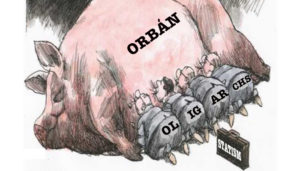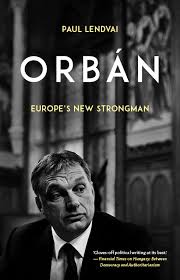 Hungary is no longer a democracy, says Nóra Köves, an activist with the pro-democracy Eötvös Károly Institute.
Hungary is no longer a democracy, says Nóra Köves, an activist with the pro-democracy Eötvös Károly Institute.
“I wouldn’t say that, no. Not, I think, any more. We are heading to a kind of dictatorship, but we are not there yet. We are somewhere between,” she tells the Guardian.
In some respects Hungary’s descent into semi-authoritarianism follows a familiar storyline: the constitutional jiggery-pokery; the use of legal tools to neuter courts, intimidate media and tilt the electoral playing-field; the avoidance of outright oppression or violence, the Economist observes. What makes the Hungarian case different, says Michael Ignatieff, rector of the Budapest-based Central European University (which has been threatened with closure by Mr Orban), is the “collusion and compliance” of the European Union:
 An extra layer of protection is afforded by the European People’s Party, the centre-right pan-EU political group of which Fidesz remains a member in good standing. Shamefully, the EPP’s leaders have been garlanding Mr Orban with praise as Hungary’s election approaches. A more tangible form of help comes in the form of the subsidies Hungary receives from the EU, which in good years can run to the equivalent of 6% of GDP. Europe’s taxpayers are propping up a government that undermines the rule of law, and their transfers feed the systems of patronage that have come to define Mr Orban’s rule. Much of this money finds its way to cronies of the prime minister, often via overpriced procurement contracts.
An extra layer of protection is afforded by the European People’s Party, the centre-right pan-EU political group of which Fidesz remains a member in good standing. Shamefully, the EPP’s leaders have been garlanding Mr Orban with praise as Hungary’s election approaches. A more tangible form of help comes in the form of the subsidies Hungary receives from the EU, which in good years can run to the equivalent of 6% of GDP. Europe’s taxpayers are propping up a government that undermines the rule of law, and their transfers feed the systems of patronage that have come to define Mr Orban’s rule. Much of this money finds its way to cronies of the prime minister, often via overpriced procurement contracts.
Corruption in Hungary is centralised and semi-legal, making it difficult to challenge, says Jozsef Martin at anti-graft watchdog Transparency International.
 As recently as 2011, Hungary scored the highest rating possible from Freedom House, an international nongovernmental organization, but it is now the least free of all E.U. members. The corruption monitor Transparency International ranks it the second most corrupt country in the bloc, just behind Bulgaria, the Washington Post adds:
As recently as 2011, Hungary scored the highest rating possible from Freedom House, an international nongovernmental organization, but it is now the least free of all E.U. members. The corruption monitor Transparency International ranks it the second most corrupt country in the bloc, just behind Bulgaria, the Washington Post adds:
Yet Hungary is also among the greatest net beneficiaries of E.U. funds, receiving 4.5 billion euros ($5.5 billion) in 2016 — equivalent to 4 percent of the country’s economic output — while contributing less than 1 billion euros, or $1.23 billion. Generous E.U. aid and subsidies have helped the leader bankroll giant public works programs and bring down unemployment….The money has helped to buoy the Hungarian economy, which has been growing at a healthy clip. It also has found its way into the pockets of friends, allies and family members of the prime minister.
“It’s E.U. taxpayers that feed the system and allow Orban to grow strong,” said Sandor Lederer, chief executive of the Budapest-based anti-corruption watchdog K-Monitor. “He’s decided it’s not enough for you to be the political leader. You also have to be the leader of the thieves, and this is the only way you can really exercise power.”
 Far from curbing the government’s autocratic tendencies, the EU is facilitating Hungary’s descent from democracy to kleptocracy, observers suggest.
Far from curbing the government’s autocratic tendencies, the EU is facilitating Hungary’s descent from democracy to kleptocracy, observers suggest.
“Orban is waging his freedom fight against the E.U. with huge amounts of E.U. money,” Peter Kreko, executive director of the Budapest-based policy research firm Political Capital [a National Endowment for Democracy grantee], told the Post. “Lenin said ‘Capitalists will sell the rope to us with which we’ll hang them.’ Well, the E.U. is not selling. It’s giving it to Orban for free.”

A report by The Times’s Patrick Kingsley offers a chilling look at the breadth of the populist assault not only on the “hardware” of democracy — constitution, judiciary, the electoral system — but also the software: the culture, civil society, education system and religious organizations, the Times notes:
Fidesz (founded in 1988 as the Hungarian Alliance of Young Democrats) has actively pushed a narrative of Hungarian victimhood and ethnocentrism in schools, theaters and universities while vilifying any opposing viewpoint, and especially pro-democracy organizations funded by George Soros, the Hungarian-American billionaire who has become something of a whipping boy for the far right throughout Central Europe.
Even if Orbán loses Sunday’s election, for a list of different reasons Hungarian democracy has a deep hole to dig itself out of, writes Jeffrey Gedmin, a nonresident senior fellow for the Future Europe Initiative at the Atlantic Council:
 Márki-Zay, the new mayor of Hódmezővásárhely, has a twelve-point plan to begin repairing and renewing Hungarian democracy once Orbán is finally gone. Half of Márki-Zay’s proposals have to do with combatting the deep and pervasive corruption that now infects Hungarian politics and economy. Hungary performs worse on all of the World Bank’s Worldwide Governance Indicators than it did a decade ago. In its Index of Economic Freedom, the Heritage Foundation finds a sharp decline in government integrity in Hungary. Over the last decade, Hungary also took a sharp turn for the worse in the Cato Institute’s Human Freedom Index (from 28th to 44th place worldwide). RTWT
Márki-Zay, the new mayor of Hódmezővásárhely, has a twelve-point plan to begin repairing and renewing Hungarian democracy once Orbán is finally gone. Half of Márki-Zay’s proposals have to do with combatting the deep and pervasive corruption that now infects Hungarian politics and economy. Hungary performs worse on all of the World Bank’s Worldwide Governance Indicators than it did a decade ago. In its Index of Economic Freedom, the Heritage Foundation finds a sharp decline in government integrity in Hungary. Over the last decade, Hungary also took a sharp turn for the worse in the Cato Institute’s Human Freedom Index (from 28th to 44th place worldwide). RTWT
Many still see Orbán’s populism as little more than a distraction tactic, the Guardian’s Shaun Walker adds. Unlike many of the zealots in the Polish government, Orbán often seems more driven by retaining power than ideology.
“The real driver for this government is nepotistic corruption.” said Krekó.







